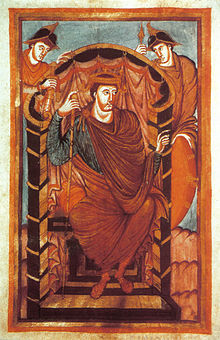BACKGROUND
Bernard of Italy was born in 797, in Picardy. He was the only son (though illegitimate) of Pepin, one of the sons of Charlemagne, then King of the Franks and later Holy Roman Emperor.
As Pepin was supposed to inherit Italy, among other territories, when he died after an illness contracted at the siege of Venice, Charlemagne recognized his grandson Bernard the right to be crowned as King of the Lombards.
His early years of King were peaceful, under the overlordship of his grandfather and the strong influence of the Archbishops of Milan. In 814, Charlemagne died and Bernard’s uncle, Louis the Pious, was crowned new Emperor. Bernard renewed his vassalage and remained cooperative with the policies of his uncle.
He later married Cunigunda of Laon and they were waiting for their first child, Pepin, in 817 when an unexpected tragedy shocked the whole Empire: an accident caused by the collapse of the wooden gallery which connected the Cathedral and the Palace of Aachen had killed the Emperor, his wife and many other people from the Imperial court.

Emperor Louis the Pious, who died in accident in April 817.
Bernard quickly travelled to Aachen and attended the funeral ceremonies for his deceased uncle. There he met his three cousins: Lothair, Pepin and the young Louis, the sons of Louis the Pious and legitimate heirs of his Empire.
It was obvious for everybody that the new situation put Bernard under the risk of being stripped of his royal rights in Italy, favoring one of his cousins. However, he quickly learnt how to exploit the rivalry between Lothair and his younger brothers, supporting the first against the later.
As Louis the Pious had no chance of writing a testament which could set the repartition of the Empire among his heirs, Lothair, the eldest son, tried to impose his will to his younger brothers: he would inherit the main bulk of the Empire, as well as the title of Emperor; Pepin, who was already King of Aquitaine, will receive that territory and Louis, who was only 13 y.o., would remain as King of Bavaria under the immediate supervision of Lothair. Bernard would continue as King of the Lombards, under Lothair’s overlordship.
Neither Pepin nor Louis, who was heavily influenced by the half-brothers of his father, Hugo and Drogo, accepted this division; thus, the tensions escalated very soon. Bernard returned to Italy after promising his support to Lothair and decided to establish his court permanently in the city Milan, as he considered it would be a safer place in case of invasion of one of the rivals of Lothair.
As expected, the negotiations failed and the first clashes between the forces of the sons of Louis the Pious started in the summer of 818…
Last edited:

